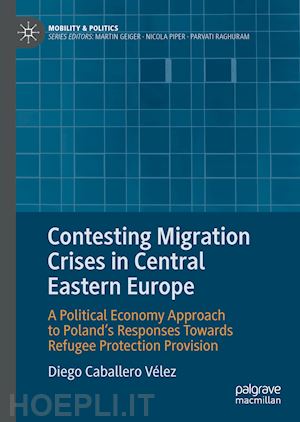
Questo prodotto usufruisce delle SPEDIZIONI GRATIS
selezionando l'opzione Corriere Veloce in fase di ordine.
Pagabile anche con Carta della cultura giovani e del merito, 18App Bonus Cultura e Carta del Docente
During the 2015 and 2016 refugee crisis the EU called on the Member States to engage in protection burden-sharing. This proposal found strong opposition from some of the Visegrad Group countries, including Poland, which expressed their reluctance to the relocation scheme securitizing the political narrative towards refugees. On the contrary, in 2022, during the Russian military aggression against Ukraine, Poland strengthened an “open door policy”, showing a humanitarian approach towards Ukrainian refugees.
This book uses a public goods theoretical framework to examine the various public goods characteristics of refugee protection in such scenarios. It is argued that the publicness and character of refugee protection is socially shaped by norms and identities. States perceive refugee protection, including benefits and costs, in different ways. The author focuses his analysis on the security/humanitarian dichotomy in states’ perceptions of refugees to investigate the accompanying vision of the inherent costs and benefits. The conceptual part of the book provides conclusive support of an alternative constructivist mode in public goods theory for understanding refugee protection burden-sharing.
Chapter 1.- Introduction.-PART I.- The political economy innate in migration governance.-Chapter 2.- International cooperation in public goods provision.-Chapter 3.- Constructing public goods: actors’ rationale behind actions.-Chapter 4.- “Unpacking” international migration governance: embeddedness and political economy.-PART II.- Forced migration in Central Eastern Europe.-Chapter 5.- Security or humanitarianism? The paradigm of refugee protection on Central Eastern European borders.-Chapter 6.- Poland: nation-building, populism and ethnicity.-PART III.- Research analysis.-Chapter 7.- Modelling preferences towards refugee protection: the case of the Polish government.-Chapter 8.- Empirical results: the provision of goods.-9.- Conclusions.











Il sito utilizza cookie ed altri strumenti di tracciamento che raccolgono informazioni dal dispositivo dell’utente. Oltre ai cookie tecnici ed analitici aggregati, strettamente necessari per il funzionamento di questo sito web, previo consenso dell’utente possono essere installati cookie di profilazione e marketing e cookie dei social media. Cliccando su “Accetto tutti i cookie” saranno attivate tutte le categorie di cookie. Per accettare solo deterninate categorie di cookie, cliccare invece su “Impostazioni cookie”. Chiudendo il banner o continuando a navigare saranno installati solo cookie tecnici. Per maggiori dettagli, consultare la Cookie Policy.